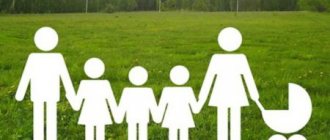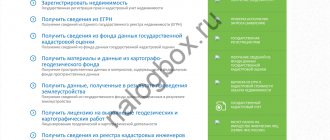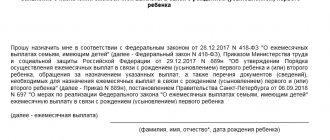Large family: what is it?
In the traditional sense, a family with three or more minor children is considered to be large. But this rule does not apply throughout the country. Taking into account the national and cultural characteristics of the Russian peoples, clause 1 of the Decree of the President of the Russian Federation of May 5, 1992 No. 431 allows regional authorities to independently determine the criteria for large families. This approach allows us to identify the problems of large families and ways to solve them at the local level.
For example, until recently in Ingushetia, a family received preferential status only after the birth or adoption of a fifth child, and in Tyva and Mari El - a fourth. Since these regions were among the leaders in birth rates, they did not need additional incentives, which is still reflected in the volume of benefits. But now the local legislation of these regions calls families with many children, as elsewhere, with three or more children.
Find out more about the status of a large family.
The advantages of a large family in Russia are that it can receive social support from both the state and local authorities.
Rules for admitting children to school and whether children from large families have benefits when admitted to 1st grade
But everyone knows that there are “good” schools, and there are not so good ones. And in order to get to such a “good” school, parents are ready to take their child across the whole city. As a rule, there are no problems going to school in your own backyard. How can I now go to the school I want to go to, but it is not in the child’s place of attachment?
We recommend reading: Is it possible to order a technical passport for an apartment from the MFC?
Since 2012, admission to first grade in Russian schools has been carried out according to new rules. According to these rules, children “attached” to the school, that is, children from nearby houses, have priority to enroll in school. Applications to schools under the new rules are accepted from March 1 to September 5.
Forms of federal support
Let us immediately note that the state provides assistance not only to families with many children, but also to other parents with newborn children. All of them, in particular, are guaranteed:
- Receiving a one-time benefit upon the birth of a child in accordance with Art. eleven ". According to “, from 02/01/2020 its size is 18,004.12 rubles. For early registration – 680.4 rubles. Such financial assistance is paid both upon adoption and for each subsequent child.
- Regular child care benefits up to 1.5 years in accordance with Art. 13 Federal Law No. 81. Its usual amount is 40% of labor income, but not more than 27,984.66 rubles and not less than 5,036 rubles. for the first child (after indexation from 1.02.20). The amount of benefit for the second and subsequent ones is no more than 27,984.66 rubles. and not less than 6803.9 rubles. The minimum benefit for non-workers is also subject to indexation. From 02/01/20 it will be at least 5036 rubles for the first and 6803.9 rubles for the first person. for the second and all subsequent children.
- A new monthly benefit for low-income families with children born in 2021 and until they reach 18 months. Payments are equal to the subsistence minimum per child in the region.
- The right to maternity capital in accordance with ", as well as the changes proposed by the President of the Russian Federation in the Address to the Federal Assembly on January 15, 2020, for everyone who gave birth to or adopted their first and subsequent children. In 2021, its size is indexed and will amount to 466,617 rubles with mandatory targeted spending. And when you receive maternity capital for a second or subsequent child, its size will be increased by 150 thousand rubles, that is, it will already be 616,617 rubles.
State social policy regarding large families is aimed at further stimulating the birth rate, which, according to the president, will come to the fore in 2021.
In the context of a declining population, the country's leadership has to resort to additional measures to support low-income, foster and large families.
In relation to the latter, for many years there has been a decree of the President of the Russian Federation on measures for social support of large families. According to it, children in such families can claim:
- benefits for utilities;
- free provision of medicines;
- privileges in the educational sphere;
- transport benefits;
- free meals in schools, provision of school uniforms and stationery;
- tax breaks, assistance in obtaining land plots, special loan programs, and so on.
The program of state support for large families in the Russian Federation in 2015-2019, according to the authorities, has become an effective measure to improve the demographic situation - the birth rate has begun to rise. By emphasizing the importance of this area, the federal authorities intend to stabilize success and prevent a decline in the birth rate in the coming decade.
In fact, a reset of the demographic development policy is being announced, which should result in federal programs for large families for 2021. At a minimum we are talking about:
- extending maternity capital until 2026, expanding the purposes of its use: the formation of monthly payments to low-income families, payment for child care;
- additional financing of monthly benefits for a third child under 3 years of age, paid in accordance with clause 2 c;
- launching a new mortgage lending program until 2023 for two- and three-child families.
These state programs for large families are not the only forms of support. For example, parents who raised seven children have the right to apply for the Order of Parental Glory and an incentive of 100,000 rubles.
Significant assistance for families with several children is also provided at the regional level.
Benefits for large families regarding the education of children at school
Measures of material support for schoolchildren from large families
Despite the fact that a child with a large number of brothers and sisters will have to enroll in school under general conditions, his financial situation during the period of receiving secondary education will be supported by the state, or more precisely, by municipal authorities and social protection departments.
Large families can count on a whole list of assistance measures if one of their children, or maybe several, is in school. Such support measures include:
- Free travel on public transport not only within your city, but also on commuter buses and trains. Parents also have the right to free travel around the city, but only those who study in a secondary school have the opportunity to travel to a neighboring city.
- Free meals - breakfast and lunch - on the territory of a secondary educational institution or secondary special education institution. In this case, the educational institution itself must spend funds on providing rations from internal funds. It is worth noting that this benefit only applies to free breakfasts and lunches. For example, you will have to pay for an afternoon snack during an after-school period.
- Receive free school and sports uniforms at least once a year. Public organizations in a number of regions of the country go further, providing not only sets of clothing, but also educational supplies, backpacks, as well as basic school electronics.
- Staying in a museum or other cultural institution is free at least once a month.
Forms of regional assistance
Subjects of the federation have broad powers to support demographic initiatives of the central government at the local level. Each region is free to independently introduce additional incentives to increase the birth rate, so support measures may differ significantly in volume from what is expected from the state.
Forms of assistance, however, are always traditional:
- City and regional payments at the birth of a child. For example, you can receive at a time from 31,104 for the first to 51,842 for the third child. In addition, monthly cash benefits are provided, limited by the age of the child (for example, up to 1.5 or up to 3 years).
- One-time regional payments for large families. Depending on the economic situation, the region may establish additional regional maternity capital for families who have given birth to a third child. In Chuvashia, for example, gubernatorial assistance to large families is 100 thousand rubles, in the Smolensk region - 163,300 rubles, in Sakhalin - 196,000 rubles, and in the Kaluga region - 50 thousand rubles.
- Tax and pension benefits: discounts on land tax, fees from individual entrepreneurs, transport tax, on property of individuals, and so on.
- Housing benefits: compensation and subsidies for utility bills, rental housing, provision of social housing and preferential lending. For example, the “Housing” program for large families, where parents are not older than 35 years, allows you to use maternity capital to pay the down payment on housing.
- Compensation for travel, stationery, school textbooks, food, cost of medicines, and so on.
We propose to dwell in more detail on each area of state and regional social assistance for large families.
Housing conditions and housing maintenance
Social protection of large families in the Russian Federation includes many areas and forms of support, in addition to financial one-time and regular payments. One of them is improved living conditions and benefits for utilities.
The housing issue is probably the most pressing problem for large families. The lack of their own living space or lack of it leads to developmental disorders in minors. Many large families live in unsanitary conditions, so providing them with decent housing is one of the main tasks of the state.
Housing support options typically include:
- provision of social housing under social tenancy agreements;
- preferential mortgage lending program with subsidized interest rates;
- allocation of land for construction, gardening or farming;
- a program of assistance in purchasing housing for large families in the form of subsidies;
- benefits for utilities.
Social housing for large families
The allocation of social apartments is carried out on the basis of the Housing Code of the Russian Federation. In this context, federal legislation does not classify such families as benefit families, therefore social housing is provided to them on a first-come, first-served basis and only on the condition that they are registered as needing improved living conditions.
Before getting on the waiting list for an apartment, a large family must prove that:
- is low-income in accordance with clause 2 of the Housing Code of the Russian Federation;
- does not own or use housing or lives in premises that do not meet sanitary standards (Article 51 of the Housing Code of the Russian Federation);
- the housing does not meet the requirements of the r. II and so on.
Regional authorities can determine for themselves whether a large family is entitled to benefits when registering real estate under a social tenancy agreement. For example, in St. Petersburg, families registered as needing new housing have the right to priority inclusion in targeted city and regional housing programs.
Read more about providing apartments to large families.
Preferential mortgage lending
From 01/01/18, families with several children can take advantage of the new preferential lending program. In addition to receiving an apartment for free from the state under a social rental agreement, young families can now purchase it on their own on preferential terms.
According to the new program, families with two or more children have the right to count on government subsidization of the mortgage interest rate if its size exceeds 6% per annum: for families with two children - for 3 years, for families with three children - for 5 years. You can take part in the program until December 31, 2022.
In addition, from 2019, upon the birth of a third child, the mortgage balance can be written off in the amount of up to 450 thousand rubles.
To obtain a loan to purchase a home, simply contact any commercial bank participating in the program. According to No. 88 dated February 19, 2018, these included:
- Sberbank,
- VTB,
- Absolut Bank,
- Gazprombank,
- Rosselkhozbank,
- Promsvyazbank,
- Raiffeisenbank and many others.
The initial contribution for participants will be from 20% of the amount - for this you can use maternity (family) capital.
Find out more about mortgages for large families.
Land grant
The right to land plots for families with three or more children arises in accordance with clause 6 of the Land Code of the Russian Federation. According to it, as well as Art. 13, regional authorities are vested with the authority to allocate land plots to large families.
They define:
- when land plots are allocated;
- who can apply for assistance in building a house in rural areas;
- on what conditions is land allocated for construction?
The Land Code of the Russian Federation allows local authorities to establish a registration requirement to improve living conditions.
At the local level, issues of the intended use of allocated land can also be resolved. Thus, the land plot is allocated for:
- housing construction;
- summer cottage construction;
- maintaining a garden or vegetable garden.
Some regions are implementing additional support measures. For example, in the Perm Territory, since 2012, it is enough to obtain land, develop a house design, and the forest for a large family for its construction will be allocated free of charge.
Find out in more detail how land is provided to large families.
Benefits for utilities
A thirty percent discount on utility bills is determined by paragraphs. b) clause 1. In addition, regions are allowed to increase the amount of subsidies for housing and communal services and expand the range of its recipients, for example, by providing such assistance to foster families with three or more minors.
Thus, in the Nizhny Novgorod region, such parents are compensated for 50% of the funds paid for housing and communal services. A similar discount is guaranteed in the Krasnoyarsk Territory and St. Petersburg, but only if there are 5 and 8 children, respectively.
The regions provide different mechanisms for calculating benefits for housing and communal services: providing a discount included in the receipt, compensation for part of the funds paid for utilities, and so on.
Find out more about utility benefits for large families.
We propose to figure out how a large family can receive a subsidy to improve their living conditions. The subsidy program allows you to partially pay the cost of purchasing or building a new home, and therefore is a priority for many families.
Housing subsidies
The provision of housing subsidies is regulated by Decree of the Government of the Russian Federation dated December 30, 2017 No. 1710 within the framework of the program “Providing affordable and comfortable housing and utilities to citizens of the Russian Federation.”
According to it, subsidies for large families are provided on a general basis, subject to the assignment of low-income status and registration as persons in need of improved living conditions.
Since subsidies are allocated by local authorities, and participation in the program is possible only on a first-come, first-served basis, regional legislation may provide for priority participation of such families in the subsidy program.
According to media reports, about 7.2 thousand families will be able to receive a housing certificate under this program in 2021. Having added personal funds, they have the right to use it for the purchase or construction of housing, major repairs, expansion of living space, and so on.
The amount of the subsidy, as a rule, does not exceed 70% of the standard cost of the purchased housing, although, for example, in the capital for large families it can be 100%.
Read more about subsidies for large families.
Required documents
You must apply for registration and receive benefits for housing and communal services at the regional Social Security office.
As a rule, there you can get detailed information on all issues related to the provision of assistance, obtain a sample application and a list of necessary documents. It may differ in different regions, so it is better to familiarize yourself with all the requirements and their features in advance. To receive the discount you will need:
- a statement about this from any of the parents;
- passport (original and copy);
- certificate of a large family;
- certificate of the need to provide benefits (about low income).
The same package of documents for benefits for large families for utilities will have to be transferred to the management company (HOA or housing office). It is she who will be directly involved in reducing fees for utility services. Additional documents may be required, which will be communicated to the applicant on the spot.
The amounts on the receipt will change starting next month . If the family has previously accumulated debt, then the discount does not apply to it. But the family can enter into an agreement with the management of the management company to restructure such debt and pay it off gradually.
To receive a subsidy, the list of documents will be more extensive:
- statement;
- applicant's passport;
- certificate of a large family;
- all birth certificates and family passports (second spouse and children);
- certificate of family composition;
- income certificates for 2021 confirming their low level;
- an extract from the personal account confirming the absence of rent debts;
- documents for an apartment (house);
- current account for crediting money.
The application is reviewed within ten days, after which a positive response is usually given. The first amount may be accrued even in the current month if the application was submitted at the beginning of the month. In the future, funds will be received regularly over six months. Upon completion, you will have to repeat the entire cycle of document preparation again.
Targeted assistance
If it was not possible to get on the list of large families for housing and the allocation of a housing subsidy, this does not deprive the right to other forms of social support, for example, participation in targeted programs. Each of them is governed by local law, so may differ in substance and form in each region.
Targeted assistance to large families is provided on an individual basis: solely on the basis of an application to the competent authorities and subject to compliance with the conditions provided by law. As a rule, they relate to the needs of family members.
In a number of regions, it is also practiced to provide targeted assistance on the basis of a signed social contract.
Forms of targeted support
The specific forms in which financial assistance is provided to large families are stipulated by the regulations of each subject of the Russian Federation separately. But this does not prevent us from identifying general forms of support that are typical for most Russian regions:
- One-time and monthly cash payments. For example, in the capital, large families with three to four children are provided with 1,200 rubles monthly. per month to compensate for the cost of living expenses. Cash assistance in the amount of 2500/4500 rubles per child is provided if the family is considered low-income and the mother or father is raising the children themselves. The list of targeted payments usually consists of several dozen types of benefits.
- Food assistance. Provided in the form of food and household packages allocated to low-income families on a monthly basis. In Moscow, such humanitarian aid is provided in the form of electronic certificates, which can be used to pay for products in retail chains participating in the program.
- Children's goods: compensation for expenses on books, toys, children's clothing and shoes, etc. Assistance can be provided both in kind and in the form of purchase certificates.
- Natural forms of support. Many regions practice providing clothing assistance, independent purchase and distribution of shoes, purchase of household appliances and other durable goods.
- Compensation for transportation costs (municipal transport, commuter trains, etc.).
- Other benefits: discounted children's trips to camps and sanatoriums, free New Year's gifts for children from large families from social protection authorities, free meals in kindergartens and schools, and so on.
Conditions for the allocation of targeted assistance
Typically, the allocation of targeted assistance at the regional level is associated not with the status of having many children, but with the need of the family. As a rule, to receive it, candidates must be officially recognized as low-income. To do this, the average income for each family member must be below the minimum subsistence level established in the region.
To calculate the average income for each family member, you need to determine their total monthly (official) income and divide the resulting amount by the number of people. If it is below the PM, you can seek targeted help.
The total income should include all official income, starting with parents’ salaries and ending with grandparents’ pensions and preferential payments for having many children.
Registration procedure
Targeted financial assistance is usually issued at the Department of Social Protection of the Population in the area of residence of the family on the basis of an appropriate application.
USZN specialists will study the application and submitted documents, make a decision on assigning preferential status to the family, and then assign the appropriate forms of targeted support.
In some regions, for example, you can obtain the status of a low-income family through the MFC or the State Services portal.
The result of the application will be known within 10 days from the date of submission. The social protection authority is obliged to notify the applicant in writing. The answer depends on the completeness of the documents, the list of which in each case is determined by the individual characteristics of the situation.
Package of documents
The following must be attached to the application for recognition of a low-income family and provision of targeted assistance:
- copies of parents’ passports and birth certificates of minor children;
- marriage certificate;
- a copy of the ID of a large family, if available;
- certificate of family composition at the place of residence;
- documents confirming family income for the last quarter;
- title documents for housing, if available;
- other documents at the request of USZN specialists.
Possible reasons for failures
Applicants do not always receive a positive result. Targeted monthly and annual assistance to large and low-income families is not provided, as a rule, for the following reasons:
- submitting false information, forged or invalid documents;
- exceeding the average income for each family member of the subsistence level in the region of its residence;
- family moving to another region or lack of registration at the actual place of residence;
- lack of grounds for recognizing a family as low-income, and so on.
The refusal of the State Health Insurance Fund to prescribe assistance must be motivated.
Low-income large family: what is expected in 2021?
Every low-income family that has received this status can count on support. Payments are made from the local budget; most often such assistance is provided for families with children.
The state has provided the following social benefits and benefits for low-income families in 2021:
- Child benefits;
- Providing social mortgages on preferential terms;
- Subsidies for payment of utility bills;
- Tax deductions at the place of work;
- Free travel on public transport;
- Free meals in school canteens;
- Receiving a basket of products for a newborn in the children's kitchen.
The amount of the benefit depends on the situation and region of residence. Thus, it is possible to receive targeted assistance, for example, by September 1 to purchase goods for a schoolchild. In educational institutions, the amount of benefits for students from low-income families is determined independently.
Which family is low-income?
Only low-income families can count on payments. This status is determined based on average income over the last three months. If it turns out to be less than the subsistence minimum, a benefit will be assigned.
Thus, the following families can count on help:
- Incomplete, where there is only one parent;
- Large families;
- Those receiving a minimum income;
- Military families;
- Families that include pensioners and disabled people.
A family where its members deliberately do not work or engage in bad habits will not be able to apply for benefits. To keep your income to a minimum, you need to register with the Employment Center and actively look for work.
Low-income people are entitled to two types of benefits:
- One-time assistance (EDA). Usually it is timed to specific life situations of a person: the birth of a child, loss of housing, etc. It is issued once.
- Regular payments. They are credited once a month. They need to be renewed every year, provided that the family’s income and situation corresponds to the “poor” status.
The size and procedure of payments depends on the specific case.
Currently, such families can receive the following one-time assistance benefits:
- Benefit for pregnant low-income people. To receive it, the mother needs to register for up to 12 weeks. The payment amount from 02/01/2021 will be 708.23 rubles.
- When a child is born, the state pays 18,886.32 rubles.
- Benefit for the poor for a child adopted from an orphanage. The amount is 18,886.32 rubles, but it can only be received six months after the court makes a verdict on adoption.
- Social benefits for low-income families on September 1. It is paid to help parents get their child ready for school. The amount of assistance depends on the region. Muscovites receive the most - 5 thousand rubles per child.
- Pregnant women, if their husbands serve in the RF Armed Forces during this period. They are entitled to 29,908.46 rubles.
- Financial support. The conditions for obtaining it vary depending on the subject of the Russian Federation. The amount also depends on the specific region.
In addition to these payments, other types of assistance may be established in each region.
You must apply for benefits annually – before the end of September.
You will need to collect a complete set of documents:
- Application requesting monthly payments;
- Personal document of parents;
- Birth certificate of babies;
- Certificate of family composition;
- A paper confirming income for each member - issued by the employer or the Pension Fund;
- Bank account statement – details for transferring benefits;
- Other papers, for example, a document from the Employment Center, a certificate of adoption.
Difficulties in assigning benefits may arise if one of the family members has disappeared, and it is not possible to establish his whereabouts and obtain certificates of income. In order for the payment to be assigned, it is necessary to obtain a certificate from the police about the initiation of a criminal case based on the search. Accordingly, you need to apply there.
What state social benefits are available up to the age of 18 for low-income families:
- Compensation for travel on public transport.
It is paid only if the child is forced to travel to school by public transport due to a lack of places in an institution located near the home. The size of the payment depends on the city of residence. On average, from 100 to 500 rubles are allocated every month. - School uniform allowance
. The amount is determined by regional authorities. For example, in St. Petersburg in 2018-2019. it is a little more than 4 thousand rubles. - Scholarship
. Full-time university students receive 2,010 rubles. If a child receives secondary vocational education, his scholarship will be 730 rubles.
Also at the regional level, children can receive the following types of assistance: free meals in school canteens, textbooks, free visits to museums, compensation for medications, etc.
You can contact:
- To the social protection authorities.
- At the MFC.
Registration can also be completed on the State Services website. Social security approves benefits for the poor within 10 working days from the date of application.
What date do benefits arrive?
Money begins to be transferred no later than the 26th day of the month following the month in which the application for financial assistance was accepted. If a family receives regional payments, the accrual period is set by local authorities.
Women who are registered with a doctor before 12 weeks of pregnancy are entitled to a one-time benefit. It can be:
- those working under an employment contract, from whose salary the employer transfers contributions to the Social Insurance Fund (SIF);
- unemployed;
- full-time students;
- contract employees.
The document that serves as the basis for assigning benefits is a certificate from the antenatal clinic or from another doctor who registers in the early stages of pregnancy.
From February 1, 2020, the benefit amount is 675.15 rubles. Perhaps there will be indexation in February 2021. The Government Decree will be issued around the end of January 2021. The amount does not depend on how pregnant the woman is. I registered and received the money.
Either parent receives benefits at the birth of a child. The amount is fixed for everyone and does not depend on income, region of residence or the number of children in the family. From February 1, 2020, the amount is 18,004.12 rubles.
If not one, but two, three or more children were born, then money will be paid for each. There is no benefit for a dead baby. Benefits are received not only by relatives, but also by foster parents, adoptive parents, and guardians. The amount of the payment is the same, but there are exceptions: adoption of a disabled child, a child over 7 years old, as well as children who are brothers/sisters. In this case, parents will receive 137,566.14 rubles.
The regions have their own programs to support large families. As an example, I will consider the donor region Moscow and the subsidized Ivanovo region. The scale of the tragedy is especially visible in contrast. I am considering payments that can be received by all families with three or more children, and not just those recognized as low-income. For the last category there are a number of additional benefits that are not included in the article.
To receive a one-time cash payment, a low-income family (or citizen) should contact the social security office at their place of residence . In most regions, it is possible to submit documents through a multifunctional center (MFC), and in some regions you can even use the federal or regional State Services portal.
The list of documents may vary depending on the region and the specific situation, but usually it includes:
Education and health support
Social assistance to large families does not end with targeted support. They can count on state and regional assistance in the fields of education and health care.
Although it is of a secondary nature, it is nevertheless an important aspect of social support that families have the right to count on.
Types of assistance
In accordance with the decree of the President of the Russian Federation dated May 5, 1992, such state assistance includes:
- free school meals for large families in 2021;
- priority admission of children to preschool institutions, elimination of queues at nurseries;
- free provision of medicines and other drugs purchased according to medical prescriptions for children under 6 years of age;
- provision of a school uniform or a replacement set of clothes for attending school classes, as well as provision of sports uniforms for the entire period of education and other assistance to the school.
Most regions are not limited to providing only government forms of support. Many of them provide their own types of assistance:
- priority provision of places in regional universities for applicants who have passed the Unified State Exam, all other things being equal;
- free educational services under additional education programs;
- visiting cultural institutions on preferential terms;
- priority provision of vouchers to health organizations;
- one-time assistance to large families for first-graders;
- one-time payments upon admission to a university;
- an annual payment for the purchase of school writing supplies (in Moscow - 10,000 rubles are paid once a year for the purchase of clothing for each schoolchild) and so on.
There is no such variety of support measures in the medical field. They usually only provide:
- priority service in healthcare organizations;
- additional provision of medicines;
- social services for families with disabled children;
- referral for sanatorium-resort treatment.
Conditions for receiving assistance
Most support measures, if provided for by regional legislation, are provided to families with three or more children upon request. The law does not provide for any conditions for obtaining it: a documented status of having many children and submitting an appropriate application is sufficient.
A social card, documentary evidence of poverty and compliance with other formal conditions are not required to receive assistance. Although it cannot be ruled out that regional legislation may still have its own specifics for certain types of benefits.
Where to get it
This type of support is usually provided at the place of request by responsible persons and is determined by regional regulations depending on the type of assistance:
- To provide free meals at school, you need to contact the head of the educational institution;
- to obtain medications, go to your local pediatrician;
- to receive financial payments or funds for the purchase of a school uniform, go to the department of benefits and assistance of the local USZN.
This is only state and municipal support. In addition to it, in almost every major city there is a center for assistance to large families "". Its creators strive to unite large families and build a system of mutual assistance:
- provide targeted assistance;
- help parents in organizing and developing a family business;
- send volunteers to help those in need;
- working on the socialization of families.
Today, this organization supports more than 75,000 large families.
Other non-profit organizations include the Red Cross, which operates in every major city. To find out which Red Cross helps large families and where it is located, we recommend contacting one of the organizations near your place of residence.
Numerous charitable foundations also provide support to those in need.
Help from charitable organizations
Non-state support can sometimes be much more tangible than government support. Charitable assistance to large families is aimed at citizens in need, so the main condition for receiving it is low income or a difficult life situation.
Philanthropists take patronage over those in need and try to help on the merits of the problem that has arisen.
For example, the “” fund will help renovate a nursery or raise funds for expensive treatment abroad.
The Foundation helps large families with equipment and toys. And Dmitry Nagiyev’s fund “provides food, financial and other possible assistance.
Benefits when enrolling in school: can they exist and what are they associated with?
What benefits are provided to large families when enrolling in school?
According to Article 43 of the Russian Constitution, every person in the country has the right to receive general education. Moreover, a citizen is required to complete at least nine classes. The responsibility to provide him with this opportunity lies with the parents or other official representatives filling their roles.
But the main thing remains the fact that, regardless of the financial situation of the family and the number of other minors, every child will be able to attend school. It turns out that he has no obstacles to obtaining a secondary general education. Then, in principle, do future schoolchildren from a large family need benefits?
In fact, in some families the problem of sending a child to school is quite acute. The fact is that since 2012, gradually the constituent entities of the country began to adopt such a provision of the Education Law, which regulates the procedure for admission to school at the place of registration. In other words, whichever school is located closest to the official place of residence, the child should be sent there.
Providing legal support
Another type of assistance that large low-income families may qualify for is free legal support. The right to it is guaranteed to preferential categories of the population by the Federal Law of November 21, 2011.
Types of guaranteed services
In accordance with Art. 6 Federal Law No. 324, the following types of legal assistance can be provided to preferential categories of the population:
- oral and written legal advice;
- protection of the rights of large families in state and municipal bodies, representation in court;
- drawing up documents of a legal nature: complaints, statements, appeals, petitions, statements of claim;
- other types of assistance not prohibited by law.
Where to get legal help
Federal Law No. 324 provides for the existence of a state and non-state system for providing legal assistance. In accordance with Art. 15, the state system is represented by:
- federal and regional executive authorities - provide oral and written advice on issues within their competence;
- – are created at the local level and provide a full range of legal services;
- lawyers participating in the system on a voluntary basis. Lists of such lawyers can be found at.
The non-state system, according to the law, is represented by:
- legal clinics created at law universities from among students and teachers;
- non-state centers of free legal assistance, created by associations of lawyers, provide a full range of legal support. The list of existing centers can be found.
In addition, to receive such assistance, you can contact any fund for supporting large families operating in your locality.
Terms of assistance
By virtue of the law, having many children is not a basis for receiving free legal assistance, therefore, according to Federal Law No. 324 dated November 21, 2011, such families can receive advice only if they are low-income, have a disability, including children, and if they meet other preferential categories.
Help in purchasing a car
In 2021, the government extended the Family Car state program. According to it, families with two or more children have the right to purchase a car no more than 1 million rubles on credit for 3 years with a discount of 10% of its cost (for the Far Eastern region - 25%). In this case, a mandatory condition will be to make a 20% down payment of the total cost of the car.
Similar programs also operate in the regions, but they are not limited to preferential loans and discounts on the purchase of a car.
For example, in the Novosibirsk region, families raising 7 or more minors are provided with a free car.
Find out more about whether a car is suitable for large families.
Exemption from transport tax
In accordance with the Tax Code of the Russian Federation, transport tax is considered regional. It is introduced by the laws of the constituent entities of the federation, they also determine specific tax rates and categories of beneficiaries who receive tax exemptions or discounts.
For example, in the Kostroma region, low-income families with five or more children can receive a 50% tax discount on a car with an engine no more powerful than 150 l/s.
In St. Petersburg, families with four children are completely exempt from paying transport tax, and in the Samara region such benefits apply only to families using minibuses.
Support for single mothers
Single mothers with many children are a particularly vulnerable category of the population. Single mother status allows women to qualify for additional forms of support:
- special working conditions: such mothers may qualify for additional leave, time off, weekends, special work schedules, protection from dismissal, and so on;
- personal income tax deduction in the amount of 6 thousand rubles for the third and each subsequent child;
- regional benefits for utilities;
- regional benefits for single mothers and so on.
Most payments and child benefits are paid to single mothers in the same amount as to parents raising children together.
Help for families with disabled children
The presence of disability in at least one of the children, including adopted children, significantly expands the list of state and regional benefits. Additional ones include:
- accrual of social pension and supplements to it - about 14.6 thousand rubles;
- compensation payments for caring for children with special needs in the amount of 60% of the minimum wage;
- allowance for a disabled child from a subject of the federation;
- cash payment to able-bodied but unemployed parents caring for a disabled child - 5.5 thousand rubles;
- labor benefits: from a shortened working week to early retirement;
- housing benefits: a 50% discount on utility bills, priority provision of social housing, and so on;
- transport benefits: free travel on public transport, 50% discount on intercity travel, free travel to the place of treatment.
Moscow privileges for large families
The legislation of the capital provides the following privileges for large families:
| Preschoolers | They enter the kindergarten without waiting in line; Receive free prescription medications; They receive milk nutrition free of charge. |
| Pupils | They have free breakfast at school once a day (primary grades); Have a 50% discount on travel when using city public transport; Relax in sanatoriums and summer camps for free Receive free textbooks; Attend paid sports clubs free of charge; |
| Students | Lunch is available at low cost or free of charge; Reduced travel costs (similar to schoolchildren); |
| Parents | Exempted from paying for kindergarten; The father or mother has the right to travel free of charge on public transport; They will not be charged for parking for 1 year; Exempt from transport tax; Free visits with children to zoos, parks, exhibitions and museums (once a month); The right to visit the Bolshoi Theater at a discount; Visit Moscow baths for free; First of all, garden plots are received; Have the right to receive housing and subsidies for its construction; Mothers who have given birth to 10 children receive an additional payment to their pension; Have the right to temporary use of social housing (if the number of children is 5) |
At the federal level, you can get free medicine for a child under 6 years of age.
In Moscow this age has been increased to 18 years. Transport discounts do not apply to the use of minibuses and taxis.
In Moscow there are numerous social service organizations, rehabilitation centers, social shelters and organizations that provide psychological and pedagogical assistance to children from these families.
Help for low-income and young families
Low-income status expands the number of state support measures for large families, which, as a rule, are assigned at the regional level. One of the most effective measures is the provision of benefits. For example, in St. Petersburg this benefit is 10.4 thousand rubles.
Find out more about payments for low-income families.
As for supporting young families, the law does not provide any special benefits for them. The only thing they can count on is participation in the Young Family preferential mortgage lending program. Thanks to this, you can receive a subsidy for the purchase or construction of housing.









